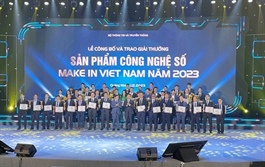Samsung joins hands with Vietnamese tech university to boost semiconductor training
Samsung joins hands with Vietnamese tech university to boost semiconductor training
The VNU-Hanoi University of Engineering and Technology signed a deal on Wednesday morning with Samsung Electronics to initiate a semiconductor training program in Vietnam.
|
Representatives of the VNU-Hanoi University of Engineering and Technology and Samsung Electronics pose for a photo with their cooperation agreements that will boost workforce training for the semiconductor industry. Photo: Nguyen Bao / Tuoi Tre |
The VNU-Samsung Technology Track program is meant to give master’s scholarships to excellent students majoring in semiconductor and microchip manufacturing, Prof. Dr. Chu Duc Trinh, president at the Hanoi-based tech university, said at the signing ceremony.
Accordingly, they will have their skills of designing microchips and producing semiconductors improved.
University juniors, seniors, and graduates will benefit from the program.
During the training process, students will also have a chance to take Korean language classes.
After finishing the Samsung-sponsored training program, master's degree holders can work at the South Korean firm in the semiconductor industry, Trinh said.
|
|
| Choi Joo Ho, representative from Samsung Vietnam, speaks at a ceremony to ink a deal between the VNU-Hanoi University of Engineering and Technology and Samsung Electronics on January 31, 2024. Photo: Nguyen Bao / Tuoi Tre |
Choi Joo Ho, representative from Samsung Vietnam, highlighted the crucial role of talent development in laying the groundwork for a nation and fostering advancements in the fourth industrial revolution.
“I expect excellent students at the university to become future leaders in the semiconductor industry via the VNU-Samsung Technology Track scholarship program,” he stated.
Speaking at the event, Pham Bao Son, vice-president of the Vietnam National University-Hanoi (VNU-Hanoi), said that the prime minister had set a target of training 50,000 highly-skilled engineers by 2030 to serve the semiconductor industry.
“The target is a big challenge for universities and training facilities in Vietnam,” Son said.
The VNU houses over 3,000 scientists and is training more than 60,000 students, he added.
The university features some 20 majors linked to the semiconductor industry, including electronics-telecommunication, electronic engineering, computer engineering, information technology, and mechatronics.
The University of Engineering and Technology, a unit of VNU-Hanoi, is actively advancing its efforts to strengthen training programs and foster collaborations with companies.
The university boasts a skilled workforce of experts specializing in the semiconductor industry.



























